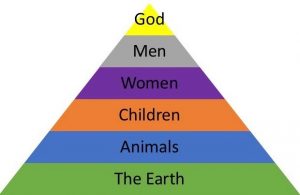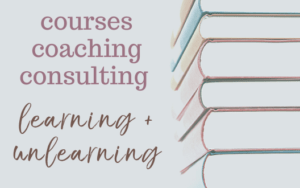I’ve been holding myself up, preventing myself from writing about why I’m vegan and how central food is to my understanding of justice. I’ve been holding myself up because this writing feels especially important, like it needs to be good, and, therefore, is triggering my need to counter perfectionism.
I’ve also been holding myself up because it’s so damn hard to write about being vegan without re-inscribing notions of whiteness and privilege. Especially from my positionality as a privileged white woman. For example, check out the commentary “Here’s Why Black People Don’t Go Vegan” or the edited collection Sistah Vegan.
I’ve been holding myself up, too, because I want to amplify vegan voices of color and question how to put my voice in the mix. Vegans of color are explaining how meat is linked to white supremacy and an intersectional web of oppression. I’ve mentioned before the blogs Black Vegans Rock and The Sistah Vegan Project. If I could accomplish nothing else, I’d hope to send readers to these and other great resources.
Against this backdrop, I still want/need to explain why I’m vegan, and a sense of urgency is becoming clear. In just one week, I’ve had three different people ask me the familiar question: “Why are you vegan?” I’ve been invited to a vegan potluck, asked to provide vegan snacks for a campus event, and asked to support a student’s vegan activism. It’s clear I need to claim and explain why veganism means so much to me.
My first two answers to why I’m vegan—cookie dough and doing something small and sustained—are pieces of the larger puzzle. For this post, I’ll attempt to share a more philosophical piece: ecofeminism.
So, Why Am I Vegan?
Short answers include the following:
- Veganism presents daily reminders for me to acknowledge and to counter violence in all its manifestations. It asks me to look at myself, my positioning, and how I’m relating (or not) with others.
- Structures of oppression build on each other, and so I want to break down speciesism alongside and as part of racism, sexism, classism, heterosexism, ableism, ageism, sizeism, etc.
- I want to affirm rights, including human rights, civil rights, linguistic and epistemic rights, and—yes, animal rights.
- I value “all my relations,” including with animals and the earth, and I continue to learn the wisdom of interconnectedness through Malea Powell’s and others’ scholarship on Indigenous epistemologies and relational worldviews.
These and other answers have emerged over decades of thinking about and reframing many relationships, including with what I eat and why. I’ve been vegan for more than three years, since December 2013. Before that, I’d been vegetarian since 2000. Though the transition from vegetarian to vegan was surprisingly smooth, I still end up at restaurants and in gatherings where options are scarce and where people look at me with tilted heads in total disbelief.
I’m frequently asked the question at the center of this series: “Why are you vegan?”
Related questions include:
- Was is hard to give up ______ (fill in a popular food)?
- How do you get enough ______ (fill in any vitamin, mineral, or protein)?
- Aren’t you still doing harm by eating ______ (e.g., quinoa, grapes, almond milk)?
- Aren’t you still killing plants?
As a recovering perfectionist, I recognize in these questions all-or-nothing thinking—or the idea that only a perfect/complete solution is a solution worth seeking.
In contrast, I believe we must invest in small and sustained actions—in whatever form they might take and however they might look.
Clearly, I was vegetarian long before vegan, and my reasons for being vegetarian are largely the same for being vegan. This is why I start with my “origin story” of learning about and wanting to strive toward ecofeminism.
Ecofeminism
Perhaps the trickiest and yet most true answer to why I’m vegan is that I believe in ecofeminism, which is a feminist belief in the equity and rights of all beings. I believe in countering all instances of exploitation, oppression, and injustice. And in affirming all forms of justice, including social, racial, gender, and economic justice. Relatedly, I see instances of injustice/justice as intimately woven together. To begin unweaving the tapestry, I take a thread that’s possible to pull. This thread is my relationship with food.
In one of my first women’s studies courses, I remember studying a pyramid like this one:

This hierarchical structure places god over men, men over women, women over children, children over animals, and animals over the earth. It represents domination and helps with visualizing the interconnected nature of –isms. The closer to the god, the more godly, good, worthy, and worthwhile. The further from god, the more exploited, demeaned, undermined, and devalued.
The goal of ecofeminism, then, is flattening hierarchies. This means seeing all beings—god, men, women, children, animals, and the earth—as worthy and worthwhile, as all having innate value and rights. This means not prioritizing men over women or humans over animals, but asking tough and sticky ethical questions that imagine relations of equity and justice.
It was studying this pyramid and imagining flattened, interconnected relations that led me to become vegetarian while still in college. From this starting point, I have continued to learn, and the more I learn, the more I see the need for everyday practices—like eating vegan—that lead to more questioning, more learning, and more desire to make change.
Dismantling systems of oppression involves, I believe, dismantling the hierarchies that are both internalized and normalized. And dismantling this pyramid is about not only countering sexism, ageism, and speciesism, but also countering white supremacy, heteropatriarchy, capitalism, and other forms of oppression. This is similarly what intersectional veganism seeks to address.
Ecofeminism is why I embrace animal rights, while emphasizing and affirming human rights. People have historically been dehumanized by being associated with animals (e.g., “dogs” or “monkeys”). As a strategy to deny human, civil, linguistic, and other rights, the association of humans with animals assumes that animals are lesser-than and unworthy of having rights. If we affirm animals as beings who also have rights, then we can disrupt dehumanization and the related stripping of human rights. Black vegan feminist theorist Aph Ko has an AWESOME video about how animal oppression relates to human oppression.
There’s a LOT more I want to write about why I’m vegan, which is why this is just one post in an ongoing series. What I can say simply is that my commitments to feminism and racial justice relate to environmental justice and veganism. So, one answer—and the one that defines my origin story and shares my philosophy—is ecofeminism. I’m certainly on a path to live and learn more, and I look forward to following where this philosophy might lead.
—
This post is written by Beth Godbee for Heart-Head-Hands.com. Feel free to check out other posts in the series “why I’m vegan” or vegan + gluten-free recipes. Please also consider following the blog via email. Thanks!



Thank you! I can relate to your words.
Thanks for sharing this feedback, Beth